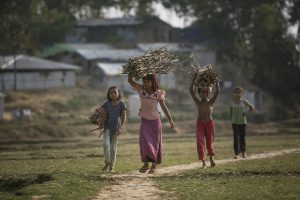The United Nations refugee agency is participating in a controversial pilot project to repatriate Rohingya refugees from Bangladesh to Myanmar, despite stating publicly that the conditions are not currently safe enough for their return.
The involvement was revealed in an email from Ramanathan Balakrishnan, the U.N.’s resident coordinator in Myanmar, that was obtained by the Myanmar Accountability Project (MAP) and publicized late last week. In the email, dated March 16 and sent to unnamed recipients working for U.N. agencies in Myanmar, Balakrishnan confirmed that boats belonging to the U.N. were used to transport officials from Myanmar’s military government from Rakhine State to Bangladesh on March 15. The U.N. markings were removed from the vessels prior to the trip.
Nearly 1 million Rohingya civilians are currently stranded in a series of large refugee camps around the town of Cox’s Bazar in southeastern Bangladesh. Most fled there from Myanmar’s Rakhine State in August 2017, when the Myanmar armed forces launched a fierce “clearance operation” that saw civilians shot and dozens of villages razed to the ground – a series of attacks that U.N. officials said displayed “genocidal intent.”
Bangladesh and Myanmar’s military government are currently implementing a pilot repatriation project, mediated by China, that would see some 1,140 Rohingya refugees returned to Myanmar. The trip by junta officials was intended so that officials could interview and verify the identities of the refugees who have been listed as candidates for the program.
According to Balakrishnan, UNHCR and the U.N. World Food Program “provided their boats to the Myanmar repatriation pilot mission for its trip from Mangudaw to Teknaf.” His email states that the decision to transport the officials followed what he described as “a very firm request” from junta authorities in Maungdaw township, Rakhine State. In the case of UNHCR, the officials cited the agency’s “MoU with the de facto Ministry of Immigration and Population.”
“The request was made at very short notice – 36 hours before the planned trip was to take place,” Balakrishnan added. “All U.N. markings were removed from all boats.”
The U.N. agencies acquiesced to the request despite its official position that the conditions in Rakhine State “are currently not conducive to the sustainable return of Rohingya refugees,” as a UNHCR spokesperson told the media last week. While refugees had the right to return to Myanmar, the spokesperson said, any repatriation “should be voluntary, in safety and dignity, and allow for sustainable reintegration in Myanmar.” Balakrishnan made an almost identical statement in his email, stating that conditions in Rakhine State are “currently not conducive to the safe and sustainable return of Rohingya refugees.”
In the email, Balakrishnan confirmed that UNHCR was “not involved in the bilateral discussion between the Government of Bangladesh and the de facto Myanmar authorities leading up to this current visit.”
UNHCR maintains the importance of the interaction between the Bangladesh government and the de facto authorities, and that the refugees are consulted and given opportunities to receive appropriate information from the de facto Myanmar authorities. It is unclear if the involvement of U.N. agencies extends beyond this episode.
In last week’s statement, the MAP alleged that this decision amounted to “ceding to junta pressure to send the refugees home as part of a PR stunt, to show to the world that planned elections will be free and fair and supported by the people of Myanmar.”
“For the U.N. to be supporting this blatant piece of junta propaganda in advance of sham elections brings the U.N.’s involvement in the genocide of the Rohingya to a new low,” said MAP’s director, Chris Gunness. In particular, Gunness added, the decision to remove the U.N. insignia from the boats “seriously compromises the U.N.’s neutrality, it jeopardizes aid deliveries across the country, and puts at risk the lives of humanitarian workers.”
This incident highlights a tension very often faced by U.N. agencies who find themselves in actual or potential tension with their host governments. Reliant on the latter’s consent and characterized by an institutional culture of conflict avoidance and a professional culture of self-preservation, many U.N. agencies see the need to “go along to get along.” This approach can be defensible in certain circumstances, such as in the provision of vital aid without which people might suffer or starve. As Balakrishnan rightly noted wrote in his email on March 16, “our work here in Myanmar requires a tight-rope act if we are to be of service to the people of Myanmar.”
But this tension is dialed up to a high pitch in cases such as Myanmar, in which the host government is committing horrific atrocities, is opposed by a large part of the country’s population and is seeking to co-opt international aid efforts to bolster its own ends.
Since the coup of February 2021, there has been heated debate surrounding the question of whether U.N. agencies still operating in Myanmar should engage at all with the military junta. Some claim that these engagements serve to legitimize the military administration, and give it access to resources that it can co-opt or redirect to its own ends. Others, including many in the U.N. system, argue that there is valuable work that would simply cease were U.N. agencies to adopt such a policy, which might well result in their expulsion from the country.
The dilemma is not always easy to resolve and is highly dependent on the agency and sector in question. But in the case of the Rohingya repatriation mission, there is good reason to think that there was little real benefits of acquiescing to the junta’s requests – and that this was a case in which the U.N. agencies in question should have taken a stand.

































